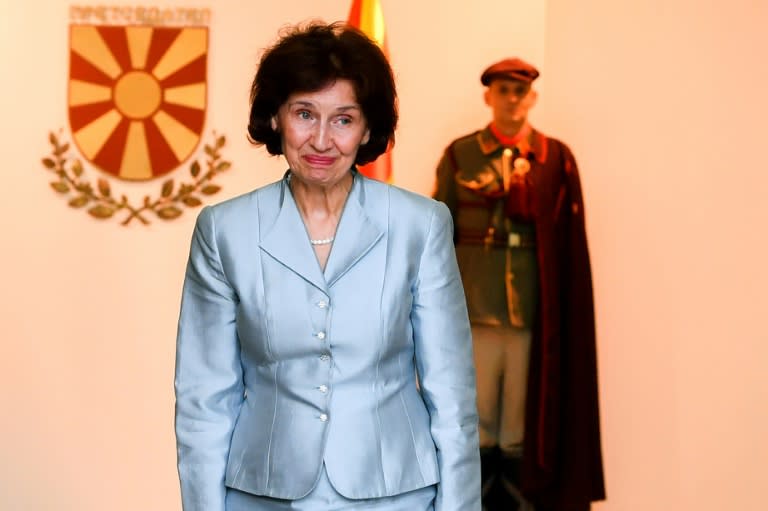Greek PM slams N. Macedonian president in new name row

- Oops!Something went wrong.Please try again later.
- Oops!Something went wrong.Please try again later.
Greek Prime Minister Kyriakos Mitsotakis hit out Monday at North Macedonia's new nationalist president for refusing during her oath of office to use her country's new name, formulated to end a bitter row between the neighbours.
The Balkan nation added "North" to its title in 2018 to end a long-running dispute with Greece, which for years blocked Skopje's bid to join NATO and the European Union.
Greece also has a province called Macedonia, which borders its northern neighbour, and the two countries have been at loggerheads over the heritage of Alexander the Great, who created one of the largest ancient empires in history.
In her oath Sunday, President Gordana Siljanovska-Davkova said she would "respect the constitution and the laws and... protect the sovereignty, territorial integrity and independence of Macedonia".
It prompted Greece's ambassador to Skopje to walk out of the inauguration ceremony in protest, according to local media reports.
And on Monday Mitsotakis rounded on her. "The provocative choice of the new president of North Macedonia to violate the official text of her oath and call her country by a different name is an illegal and impermissible initiative," he wrote on X, formerly Twitter.
The official written text of Siljanovska-Davkova's address included the official name of "North Macedonia", an AFP reporter saw.
Her country added "North" to its name following a historic agreement with Mitsotakis's left-wing predecessor, Alexis Tsipras in 2018.
- Bulgaria tensions -
But Siljanovska-Davkova's party, the nationalist VMRO-DPMNE, opposes the accord and has refused to acknowledge the country's new name.
The right-wing party triumphed in parliamentary and presidential elections on Wednesday, with the ruling Social Democrats (SDSM) conceding defeat even before official results were announced.
The new president's cabinet on Monday said Siljanovska-Davkova "has the right to use the name Macedonia, as an act of personal right of self-determination and self-identification."
"President Gordana Siljanovska-Davkova will abide by the official application of the constitutional name," her office said, adding that she expects Macedonian partners to respect the same obligations.
The caretaker government in Skopje also waded in, with the foreign ministry calling on "all political stakeholders, especially elected state officials" to respect the name agreement.
Skopje's 2018 Prespa Agreement with Athens to add the prefix "North" to its name ended decades of quarrelling between the neighbours.
Greece for years opposed North Macedonia joining NATO -- it finally became a member of the alliance in 2020 -- and delayed talks on it eventually joining the European Union over the issue.
The conservative Mitsotakis, whose party had strongly opposed the 2018 agreement, said Siljanovska-Davkova's speech on Sunday violated both that accord and North Macedonia's constitution.
He warned on Monday that "any progress in bilateral relations, as well as any steps taken by Skopje towards Europe, depend on the sincere observance of what was agreed.
"We will not accept similar slip-ups," the Greek premier added.
Tsipras's party Syriza has long criticised Mitsotakis for not ratifying a number of cooperation protocols in the agreement during his five years in power.
Given the latest developments in Skopje, "it might be better" that the protocols have not been approved, Greek government spokesman Pavlos Marinakis said Monday.
European Commission president Ursula von der Leyen said on X on Sunday that North Macedonia must keep to "the path of reforms and full respect for its binding agreements, including the Prespa Agreement", to continue its path towards EU accession.
The return to power of the nationalist right in North Macedonia also risks reigniting tensions with Bulgaria, which has long blocked EU accession for Skopje due to linguistic and historical disputes.
dd-jph/nmc

